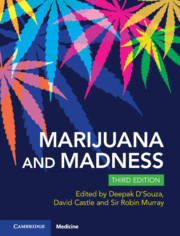Book contents
- Marijuana and Madness
- Marijuana and Madness
- Copyright page
- Contents
- Contributors
- Preface
- Part I Pharmacology of Cannabis and the Endocannabinoid System
- Part II The Changing Face of Cannabis
- Part III Cannabis and the Brain
- Part IV Cannabis, Anxiety, and Mood
- Part V Cannabis and Psychosis
- Part VI Cannabinoids and Schizophrenia: Aetiopathology and Treatment Implications
- Chapter 17 Does Cannabis Cause Psychosis?
- Chapter 18 Post-mortem Studies of the Brain Cannabinoid System in Schizophrenia
- Chapter 19 The Endocannabinoid System in Schizophrenia
- Chapter 20 Cannabidiol as a Potential Antipsychotic
- Chapter 21 Genetic Explanations for the Association between Cannabis and Schizophrenia
- Part VII Cannabinoids and Schizophrenia: Aetiopathology and Treatment Implications
- Part VIII Special Topics
- Index
- References
Chapter 17 - Does Cannabis Cause Psychosis?
The Epidemiological Evidence
from Part VI - Cannabinoids and Schizophrenia: Aetiopathology and Treatment Implications
Published online by Cambridge University Press: 12 May 2023
- Marijuana and Madness
- Marijuana and Madness
- Copyright page
- Contents
- Contributors
- Preface
- Part I Pharmacology of Cannabis and the Endocannabinoid System
- Part II The Changing Face of Cannabis
- Part III Cannabis and the Brain
- Part IV Cannabis, Anxiety, and Mood
- Part V Cannabis and Psychosis
- Part VI Cannabinoids and Schizophrenia: Aetiopathology and Treatment Implications
- Chapter 17 Does Cannabis Cause Psychosis?
- Chapter 18 Post-mortem Studies of the Brain Cannabinoid System in Schizophrenia
- Chapter 19 The Endocannabinoid System in Schizophrenia
- Chapter 20 Cannabidiol as a Potential Antipsychotic
- Chapter 21 Genetic Explanations for the Association between Cannabis and Schizophrenia
- Part VII Cannabinoids and Schizophrenia: Aetiopathology and Treatment Implications
- Part VIII Special Topics
- Index
- References
Summary
In this chapter, we discuss whether there is a causal relationship between cannabis use and psychosis in terms of the criteria of causality proposed by Bradford-Hill. We conclude that the evidence for each of the criteria ranges from consistent in the context of strength, consistency, and temporality; strong in the context of biological gradient and experimental evidence; plausible in the context of biological plausibility and coherence. The association is not specific for psychosis but also includes depression and suicidal thoughts, and it is unclear whether the analogy criteira are appropriate. Thus, the epidemiological, experimental, and genetic evidence suggests that cannabis, particularly high potency cannabis, is a contributing factor to the incidence of psychosis in the population. In consequence, over the last 20 years there has been a shift in the argument from ‘whether there is a causal relationship between cannabis and psychosis’ to considering the magnitude of this relationship.
Keywords
- Type
- Chapter
- Information
- Marijuana and Madness , pp. 167 - 177Publisher: Cambridge University PressPrint publication year: 2023

